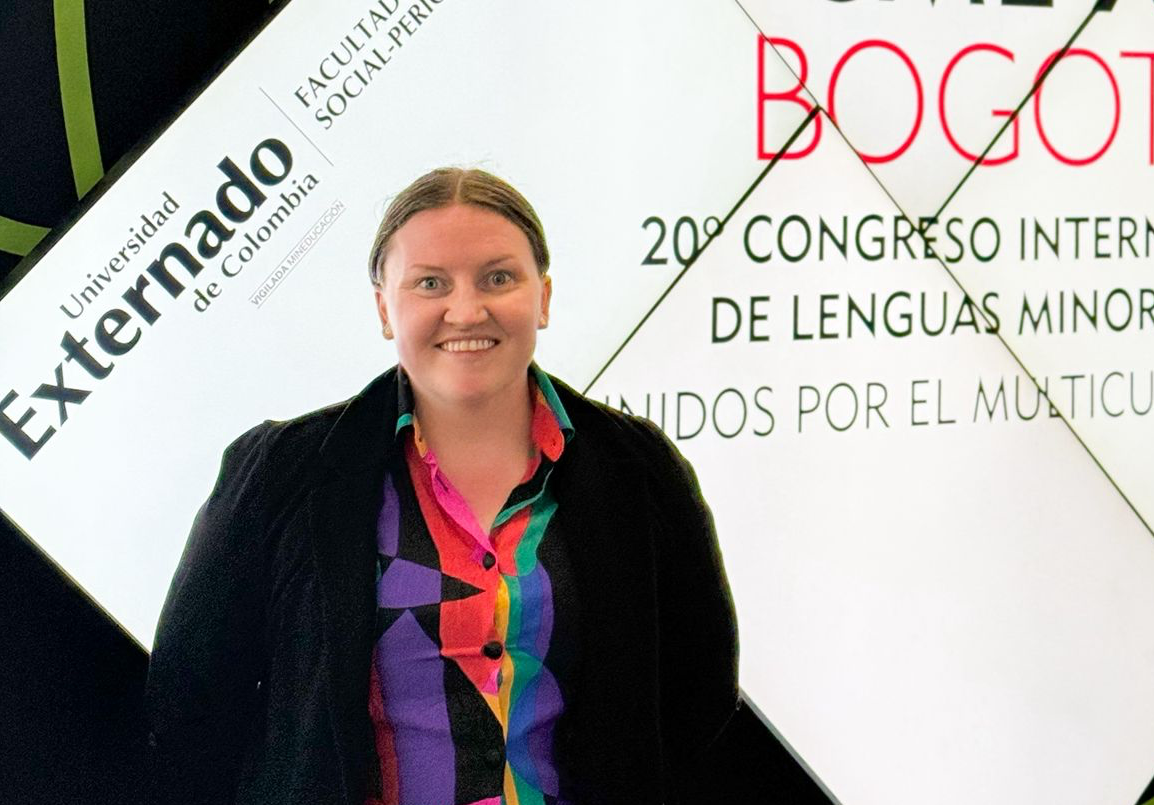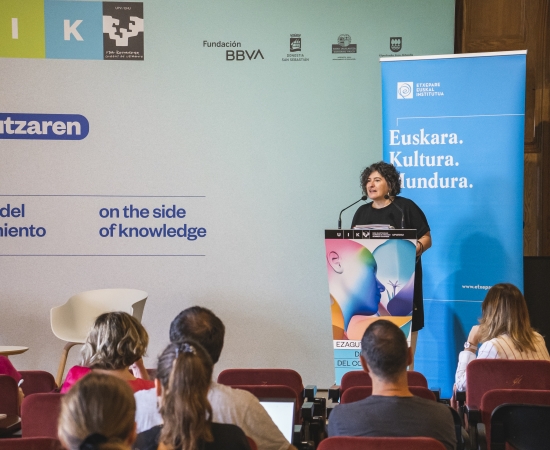Kayleigh Karinen: “Basque language brings joy and connection, but also carries the weight of historical injustice”
2025/07/11
Language diversity expert and Basque studies scholar Kayleigh Karinen has recently presented a work dealing with Basque language and well-being in Northern Basque Country.
Euskara. Kultura. Mundura.

It may not be as easy as it looks like to anticipate whether a Etxepare Basque Institute lectureship’s former student in Helsinki, Finland, would reply in Basque language for an interview invitation. And like many other out-of-the-blue things, it happened, her acceptance arrived to us in a form of a message written in a sound Soule dialect from the Northern Basque Country. Kayleigh Karinen is Basque studies graduate, M.A. Linguistic Diversity & Digital Humanities and currently LAIF Research Group Member at the University of Jyväskylä (Finland). We met her in the aftermath of the International Conference of Minority Languages held in Bogotá, at the Universidad Externado de Colombia, where she presented a paper on language ideologies in Soule, Northern Basque Country. After some comings and goings through Larrau, Tardets and Mauléon, and even some visits to the southern part of the Basque Country, Kayleigh Karinen devoted some time to explain her research experience for us.
Where are you from and where do you live?
I was born and raised in the United States, Michigan, to be exact. These days, I live in Helsinki, Finland, the land of my paternal roots, and I´ve been here for the past eight and a half years.
What triggered your interest for Basque language and Basque studies?
The short answer: herri-kirolak [Basque rural sports]. The long answer: it all started during my exchange year in Salamanca, where a course on Spanish culture introduced me to the Basque Country. I was especially drawn to the Basque culture because of its traditional Basque sports, like jai-alai [Basque basket tip], pilota [Basque pelota], aizkolaritza [woodchopping], and harri-jasoketa [stone-lifting]. I often joke that harri-jasoketa was the turning point: Basques lift rocks for sport, and I lift people, that was our initial common ground. I left Spain in 2014 knowing that I wanted to study the Basque language. And that opportunity presented itself when I move to Helsinki in 2017, thanks to Etxepare for providing Basque language and culture at the University of Helsinki. Fun fact: my first Basque class was in Finnish, while also studying Finnish for the first time!
What has driven you towards conducting research particularly at the Northern Basque Country?
I noticed a gap in the research. There is so much work being done in the Basque Autonomous Community and so little that I could find on the Northen Basque Country and even less on Xiberoa [Soule, Northern Basque Country]. There has been work on individual features of the souletin dialect but very little linguistic work, and I discovered that there was no data collected in the 2016 Street Survey in Xiberoa. I was fortunate to be sent information on a Language Documentation Summer School by a friend. Attending the Summer School allowed me a soft landing in Xiberoa and from there I made additional connections in the region. I chose to conduct research there after realizing that, according to statistics, Basque language knowledge in Xiberoa is just as high as in Gipuzkoa, the province typically seen as the most Basque-speaking. Yet, data from the Basque Government and the Street Use Survey reveal that Basque is heard in public in Xiberoa only one-third as often as in Gipuzkoa. I suspected that language ideologies were playing a role in this discrepancy.
During the ethnographic work you carried out in Soule, was there anything that sparked your interest specifically?
I was so taken by the importance of singing in Xiberoa. During my time there, we were serenaded several times by local Xiberoans [Souletins], and it became clear to me that singing holds a special place in the community. I was able to perform the Aurresku [popular Basque dance] to locals in Larrau together with a musician from Lower Navarre who belonged to a music group with Xiberoans. In addition, since my previous experiences were in the Southern Basque Country, I was surprised how little people from Hegoalde (south in Basque) knew about Iparralde (north in Basque) beyond Baiona and Miarritz, yes Miarritz [Biarritz]. During all my time in the Basque Country, rarely had people I spoke to ever been to Soule, nor did they seem to know much about its linguistic and cultural realities. For a community that often speaks of unity, this lack of cross-regional awareness felt both ironic and like an opportunity worth exploring.

Throughout your research, your aim is to analyse how Basque speakers relate Basque language to well-being. Could you please explain what your main findings were?
One key takeaway is that these ideologies have the power to both strengthen and, at times, complicate individual and communal well-being. Overall, I found that the connection and emotional attachment to the Basque language in Xiberoa overwhelmingly supports well-being. Many interviewees described this relationship in deeply personal and emotional terms, some even became visibly moved while speaking about what the language means to them. As one participant expressed, Basque language is part of his/her own identity, “like a part of my body”. That illustrates just how rooted [Basque] language is in people’s sense of self. For some, speaking Basque can be an act of resistance, but also healing after generations of suppression. It is shaped by pride and simultaneously pain as well as persistence. The language brings joy and connection, but also carries the weight of historical injustice. At the same time, this ancestral ideology can also negatively affect well-being, particularly when linked to ideas of purity or authenticity. That is, individuals who did not grow up speaking Basque at home may feel excluded or “not Basque enough”, which in turn can lead to feelings of shame, insecurity, or even withdrawal from the community.
Allegedly, the idea of normalcy is one of the key concepts that your study outlines. How should we understand that?
It is key to keep in mind that my work happens in the Northern Basque Country, where ideas of normalcy are quite opposite to those in the Southern Basque Country. What do I mean by this? In the Northern Basque Country, it is not considered “normal” to start a conversation in Basque with someone you do not know. On a general level, the use of Basque outside the home is not normalized. Purist and ancestral language ideologies often frame Basque as a private, domestic language, something tied to inheritance and authenticity, where the ´real´ Basque is considered to be the one learned at home.

And where does normalcy lead to?
It creates a social environment where many speakers, especially new speakers or those who did not acquire Basque at home, feel discouraged to learn, and hesitant or illegitimate using the language. It reinforces a perception that Basque belongs to a specific group of people and a specific set of spaces, thereby limiting its broader social use and visibility. These ideologies contribute to what I call the invisibility loop: when Basque isn’t heard in public, it becomes increasingly marked or exceptional when it is, which in turn discourages others from using it. This makes normalization efforts even more difficult because while you can increase speakers, challenging deeply held beliefs about who can speak Basque, when, and where is no easy feat. In this context, shifting language ideologies, especially around what counts as “authentic” or “appropriate”, is as critical as any institutional or educational support for learning the language.
How does the idea of normalcy relate to Basque language revitalisation?
In the Basque context, we are not so much talking about revitalization as we are about normalization, as Professor Estibaliz Amorrortu once told me. This distinction matters: revitalization often suggests breathing life back into something nearly lost, while normalization focuses on integrating the language into the fabric of everyday. Normalization is about making Basque a natural part of everyday life without thinking twice, whether you are at the store, at work, or talking to a neighbour. A good contrast to my work is that of Maddi Dorronsoro Olamusu, who looks at breathing spaces (arnasgune in Basque) for the Basque language in Gipuzkoa and finds that in towns like Segura [it] is so normalized that local people almost take it for granted or as a given. This is the type of normalcy that I interpret the speakers in Xiberoa crave.
From your perspective, what key aspects should a minority language meet, if it were to live on at a global level?
I would like to challenge the very premise of the question. From my perspective, a minority language does not need to “live on” at a global level. In fact, global linguistic dominance is often the result of colonization, erasure, and force. Languages like English, Spanish, and French did not spread through organic admiration; they spread through empire. So instead of asking how minority languages can become global, we should be asking: How can we ensure that minority languages can thrive in their own communities, without being forced to mirror the very ideologies that marginalize them? How do we support languages in becoming fully livable locally, without requiring them to conform to global standards of legitimacy and utility?
In my research in Xiberoa and experiences in the Basque Country as a whole, a recurring ideology is that “this is the Basque Country, so people should speak Basque”, an interviewee in my research who said, “In Xiberoa or the Basque Country, we should speak Basque. That’s how we understand each other and how we live. Without the language, it gets complicated. I don’t see how you can live here without speaking the local language. Some feel Basque, but if you don’t speak it, you can’t fully experience Basque identity”. At face value, this seems empowering. It reflects a desire to center the local language in everyday life and to see it treated as normal. Statements like these are dangerous because they mirror the same one-nation-one-language ideology that marginalizes Basque in the French and Spanish states. As I explain in the thesis, this is what Irvine & Gal (2000) call fractal recursivity: when a dominant ideology at the national level is unknowingly reproduced at the local level. In this case, the speaker’s well-meaning argument for local language pride inadvertently reflects the same homogenizing ideology that essentially erases linguistic diversity in France.
This contradiction reveals something essential for any minority language hoping to “live on” in the world: we must not reproduce the same exclusionary logics we seek to resist. Asserting that “you can’t fully experience Basque identity without speaking the language”, may seem like a celebration of the language, but it also sets up dangerous boundaries, ones that exclude people who want to belong but lack access, fluency, or inherited legitimacy.
So no, Basque does not in my opinion need to “live globally.” It needs space to breathe locally, with support, and a rethinking of the ideologies that shape who can speak and belong in the language. And on top of that, less focus on perfection. That is a far more sustainable vision than global spread.
Finally, do you have any intention to keep on researching about Basque language or at least relating one way or another to it?
Yes, definitely. Having said that, I am aware that being a non-Basque scholar researcher, Basque might limit certain opportunities.
Etxepare Basque Institute and the researcher
Etxepare Basque Institute fosters a lectureship programme around Basque language and culture at the university of Helsinki (Finland) and Kayleigh Karinen is one of its former students. Her resarch work has then shifted to language ideologies in the Northern Basque Country. Her latest paper has been selected for the International Conference on Language Minorities held in Colombia, with Etxepare Basque Institute´s support.



